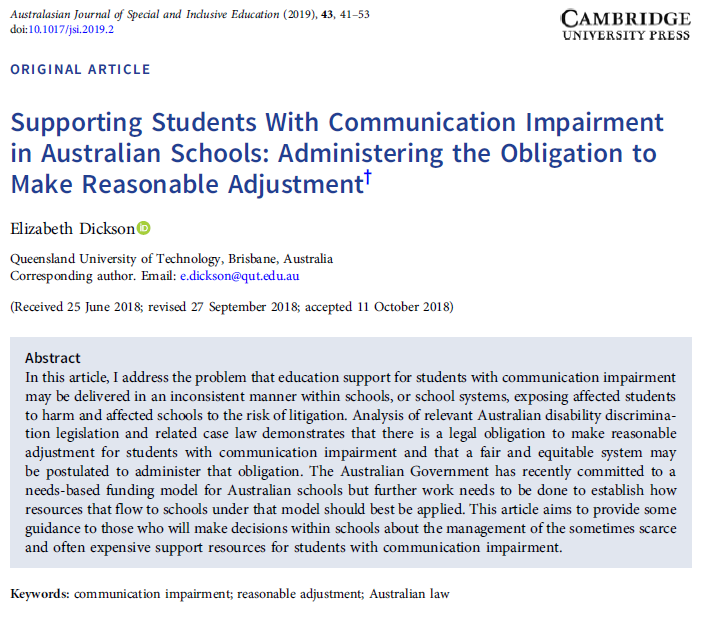This week (as I recovered from having my wisdom teeth out  ) I have done a lot of reading. Here is a real gem, published 2019 by Dr Elizabeth Dickson, legal scholar
) I have done a lot of reading. Here is a real gem, published 2019 by Dr Elizabeth Dickson, legal scholar
@QUT
I'm going to tweet some reflections... #slpeeps and #EducationSLP folks may be interested.
 ) I have done a lot of reading. Here is a real gem, published 2019 by Dr Elizabeth Dickson, legal scholar
) I have done a lot of reading. Here is a real gem, published 2019 by Dr Elizabeth Dickson, legal scholar @QUT
I'm going to tweet some reflections... #slpeeps and #EducationSLP folks may be interested.
For reference, here is a link to the paper via Dr Dickson's ePrints https://eprints.qut.edu.au/125340/
And a link to the Disability Standards for Education 2005 https://www.education.gov.au/disability-standards-education-2005
And a link to the Disability Standards for Education 2005 https://www.education.gov.au/disability-standards-education-2005
As per the Disability Standards for Education 2005 (the Standards), obligate us to:
*provide reasonable adjustments,
*consult the student (or associate) when designing/implementing adjustments, &
*eliminate victimisation and harassment
(among other obligations...)
*provide reasonable adjustments,
*consult the student (or associate) when designing/implementing adjustments, &
*eliminate victimisation and harassment
(among other obligations...)
The Standards (sections 7.2 & 7.3) state that reasonable adjustments for students with disability includes the provision of specialised services (speech pathology is stated as an example) 

As Dickson (2019, p. 46) states "An education provider cannot escape potential liability for providing such services by saying ‘that is not part of what we offer’. It is plain from the terms of the Standards s.7.2 that education providers that do not provide such a service must..
"...arrange for the external provision of the service, where the service ‘is necessary for the student to be able to participate in the activities for which he or she is enrolled’" (Dickson, 2019, p. 46).
Dickson (2019) discusses that if speech pathology services are not appropriately provided, there may be a case for  indirect discrimination
indirect discrimination under the Standards.
under the Standards.
So what is an optimal service, that limits liability for breach of discrimination law?
 indirect discrimination
indirect discrimination under the Standards.
under the Standards. So what is an optimal service, that limits liability for breach of discrimination law?
Dickson (2019, p. 48) "the role of speech pathologists in schools should be to facilitate access to education, not to ‘treat’ the communication impairment."
That is, Under DSE, the role of the #EducationSLP= supporting provision of reasonable adjustments. Not providing therapy.
That is, Under DSE, the role of the #EducationSLP= supporting provision of reasonable adjustments. Not providing therapy.
On p.49, Dickson (2019) also signals some of the pitfalls of external SP providers coming in to work in schools. E.g. "External speech pathologists may not be expert in the education environment."
This point is critical.
Working in schools requires deep and genuine knowledge of:
*inclusive education,
*the role and expertise of teachers,
*understanding of AC,
*understanding of pedagogy, and
*understanding school culture, policy, processes
Working in schools requires deep and genuine knowledge of:
*inclusive education,
*the role and expertise of teachers,
*understanding of AC,
*understanding of pedagogy, and
*understanding school culture, policy, processes
SPs only come to learn, respect and understand these facets by working in schools, alongside teachers and school leaders.
Discussion re intervention delivery. In Sievwright case (Dickson, 2019), the court ruled ‘a lay person could be trained to implement [the program]’. Those familiar with McCartney's work note the close collaboration required for these models to be effective https://onlinelibrary.wiley.com/doi/abs/10.3109/13682820903560302
Withdrawal from class: Dickson (2019), drawing on Sievwright case: the court noted that withdrawal from class to access therapy may have a negative impact on a student and their participation in an inclusive classroom environment (see p. 50).
Another critical point.
Another critical point.
My key reflections #1
SLPs in schools have a role, supported by anti-discrimination legislation, as collaborators with teachers and students to design reasonable adjustments.
This is a distinct role and different from a role in interventions.
SLPs in schools have a role, supported by anti-discrimination legislation, as collaborators with teachers and students to design reasonable adjustments.
This is a distinct role and different from a role in interventions.
Key reflection #2
SPs need to continue to learn about education policy, processes and practices. To uphold the right of students with disability to an inclusive education, we need to understand what genuine inclusion is, and work in ways that upholds this right.
SPs need to continue to learn about education policy, processes and practices. To uphold the right of students with disability to an inclusive education, we need to understand what genuine inclusion is, and work in ways that upholds this right.
Key reflection #3
While @JuliaStarling4, Ehren, Nippold, Dockrell and others have laid the foundations, we need to extend the evidence base for SP service delivery models that encompass the provision of reasonable adjustments. It is happening in practice. We need more research.
While @JuliaStarling4, Ehren, Nippold, Dockrell and others have laid the foundations, we need to extend the evidence base for SP service delivery models that encompass the provision of reasonable adjustments. It is happening in practice. We need more research.

 Read on Twitter
Read on Twitter


